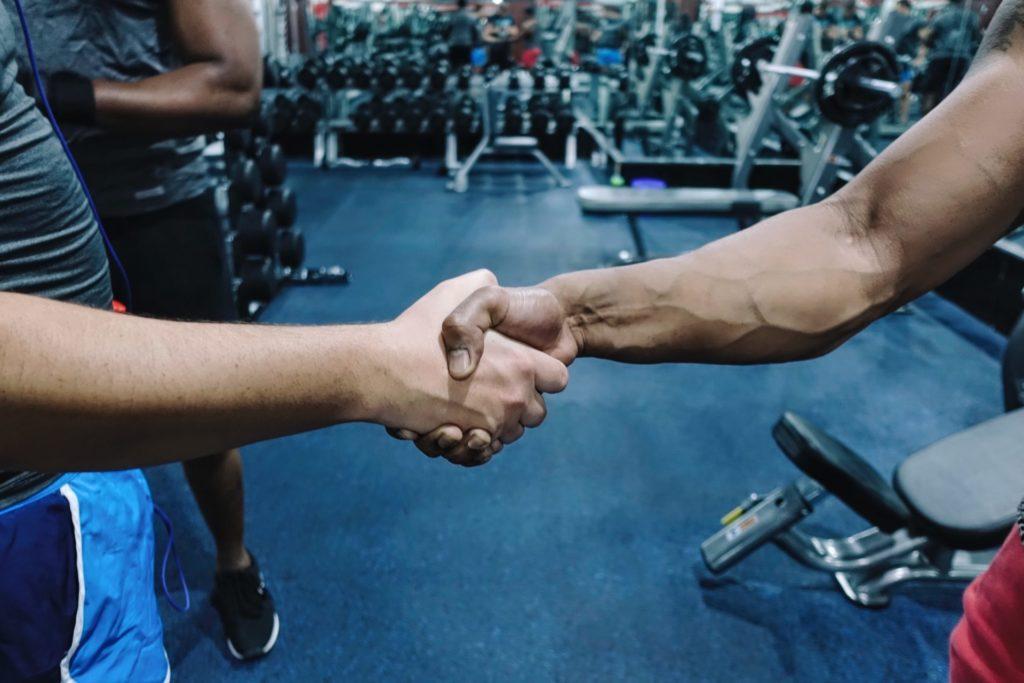Entering into a fitness business partnership is a big step that requires a lot of consideration. If you find yourself lacking certain skills within your business at a high level, you have the option to find a business partner. This isn’t just an employee, but a partner who shares your vision, mission, and passion. They come to the table with complementary skills to elevate the business.
Like most things, there are pros and cons to having a business partner. The right solution for you depends on your business and you as a person. In this article, we try to understand the advantages and disadvantages of having a business partner and the process of finding a suitable partner for your fitness business.
Skip ahead to:
- What is a fitness business partnership?
- Why have a fitness business partner?
- What are the biggest obstacles in fitness business partnerships?
- 9 things to consider when finding a business partner
What is a fitness business partnership?
A business partnership is a formal agreement or legal relationship with two or more individuals or companies. The partners agree to invest their into the business and each party benefits from the profits and sustains any losses. The precise roles and responsibilities of a partnership can differ. For instance, some partnerships can include partners with limited participation as well as limited liability for the debt. When considering a business partnership, there are different types of partnerships to consider including:
- General partnership – this refers to partners who take an active role in the day-to-day operations and both have liability as owners for debt and lawsuit.
- Limited partnership – contains general partners who have liability but also includes partners who don’t actively participate in the daily operations of the business and don’t have liability.
- Limited liability partnership – the legal protection extends to all partners. This is most common for partners in the same profession like accountants or lawyers.
When talking about a fitness business partnership, you’re most likely considering a person, maybe even a friend who shares your passion. Like any relationship, it takes work and while it can sound like a great idea, there are challenges that come with having a business partnership.
Why have a fitness business partner?
Running a business is hard and the fitness industry is no different. It takes a lot of work and time. With a startup, you tend to be wearing a lot of hats. You’re the fitness studio manager, marketing director, accountant, and personal trainer rolled into one overworked package. Often, when running a business, it can feel lonely at the top. The benefit of having a fitness business partner is that you are not alone. You have someone to run ideas past, you share the workload, and you both have a joint vision to keep you motivated.
With a business partner, you have someone to shoulder both the success and the risk of major decisions. Ideally, you share the same passion but have complementary skills. For instance, a personal trainer or fitness professional and a marketer would have combined skills in fitness, marketing, social media, and personal training. One of you may be a marketing whizz raising brand awareness and getting new leads while the other loves to speak with new members and create fitness programs.
When you’re first launching your business, an extra pair of hands can be just what you need. As you can share the workload, it could mean that you can achieve faster business growth. Better decision-making and access to a larger skillset can put you in a stronger position going forward for success.
What are the biggest obstacles in fitness business partnerships?
One of the biggest disadvantages is also a benefit and that is that you are not alone. There will always be another person who you will need to agree with to make decisions for the business as a whole. If you have a partnership agreement in place where you both make the decisions, then you can’t just go off on your own as you please.
While you’re sharing responsibilities and two heads are better than one or so the saying goes, keep in mind that you can run into some obstacles. Some of the biggest challenges in a fitness business partnership are:
- Finances – the amount you’re willing to invest into the business, as well as the expectations of income, could differ. You could also have different views on financial risk and what you’re willing to do within the business.
- Attitudes and ethics – how much time you want to commit to the business, hours working, and your attitude towards the business and each other.
- Expectations – the roles, responsibilities, and expectations of commitment could change.
- Vision – where you want yourself and your business to be in the future could look different. While you could begin with the same goals, these can change as time goes by.
There’s a lot to consider with business partnerships. It’s a huge decision that could impact the business and your relationship with that individual. If that business relationship turns out badly, it can make you feel trapped and no longer want to put the time into your business. That’s why it’s so important to take the time to evaluate who you’re partnering with and if a new partnership is right for you. It’s a very personal decision that can be a great choice or something that you may regret if you rush into the process.
For expert insight into the legal essentials fitness operators need to know to be successful, listen to Cory Sterling on The Fitness Founders Podcast. Cory is a lawyer and the owner of Conscious Council, a law firm focused on servicing health and wellness businesses. He talks about the biggest legal risks fitness business and studio owners face.
The Customer
Engagement Playbook
for Your Fitness
Business
Discover more 9 things to consider when finding a business partner
With the stress of owning a gym or fitness studio and the incoming bills, it makes sense to share the workload and find a business partner. By knowing what qualities to look for and how to spot a good partner, you can make the best decision possible for your business. Here are nine things to consider when finding a suitable business partner.
1. Look for the right qualities
Looking for the right qualities refers to the qualities and characteristics of your potential partner. You will be working and communicating with this person regularly, so they need to have excellent communication skills. If you are looking for an active partner who is active in the daily operations, they should have the skills, knowledge, and emotional intelligence to lead the business with you. There should be a good working relationship built on trust and open communication.
2. Determine the type of partnership
Think about how much you want your partner to be involved. Determine the structure of the partnership before signing the agreement. You need to identify which type of partnership you’re entering. At this point, you can speak to an accountant and an attorney who can help you to evaluate various factors and guide you on the best choice from a tax and legal perspective. All these conversations should take place early in the relationship so that there are no surprises further down the line. When you determine your type of partnership and how much your partner will be involved, you can include these elements within the operational agreement.
3. Consider the value your partner brings
Think about your strengths and weaknesses as a gym owner. Your partner should compliment your skills and bring value to the business. These skills don’t have to be related to fitness at all. Think about business management, marketing, growth, and financial acumen. If you can find a partner that possesses skills you lack, you can come together efficiently. You will both likely have an entrepreneurial spirit but look deeper into the true value your partner brings to the business.
4. Be clear on your vision, goals, and ethics
It’s important that you’re crystal clear on your vision, business goals, and ethics from the beginning. The more you can explain and agree on before the partnership, the better. You will likely need to have a few tough conversations, especially if you’re considering a partnership with a friend who shares your passion. Have an open conversation with your potential partner on values, goals, long-term financial goals, expectations, and professional goals both in and outside of the business. All these factors will influence your ability to work efficiently with your partner.
5. Make an exit plan
Sometimes life throws you a curveball and things change. Hope for the best but plan for the worst-case scenario. By preparing an exit plan while you’re on good terms and getting it in writing, it can save a lot of hassle down the line. Think about what will happen if one partner decides to leave the business. It doesn’t matter what the reason is for leaving, but it’s important to have a plan in place. Your exit strategy should be included in your partnership agreement. It has the potential to save both the relationships and a lot of money if the time comes.
6. Have a trial period
Running any business can be stressful. A fitness business like a fitness center or yoga studio is naturally customer-focused and tends to involve a lot of moving cogs. If you’re partnering with someone you know or just met, consider having a trial period. Before an official commitment, put your potential partner under pressure to see how they handle the business. Your trial period could be two weeks or one month, depending on what you need. After this time, you should see how they react under pressure and test how you work together daily. The trial period works for both parties, so your potential partner has the opportunity to leave too, no questions asked.
7. Write job descriptions for each business partner
Each partner should have clear job descriptions with roles, responsibilities, and salaries listed in the operational agreement. Evaluate each partner’s strengths and weaknesses and assign roles accordingly. If a partner had a background in marketing, it would make sense for them to manage your social media and marketing strategy. While there can be flexibility within this plan, work together to create a solid outline for your roles and responsibilities.
8. Be patient
Finding a suitable business partner for your health club is a process, so be patient. Rushing into the partnership could lead to hassle down the road with mismatched expectations and goals. Give yourself time to take a breath and analyze the situation. Lean on experts to help such as attorneys or even other business owners. Evaluate the ins and outs of the business to determine if this is the right strategy for you. Ask as many questions as possible to figure out the best partner for your business going forward.
9. Create a partnership agreement
The final part of choosing a fitness business partner is putting it in writing. At this stage, you have spoken to an attorney and accountant and know everything about your potential partner. The contract should be mutually beneficial to both parties as you should both be happy to sign it. The more detailed the contract, the better as it will make it clear exactly what you’re entering. Consider terms on important sections like investments, roles, responsibilities, profits and losses, liability, and exit strategy.
In summary
These tips will help you to choose the right business partner for your business. As an entrepreneur, you’re likely driven, motivated, and passionate to move forward. But take your time and scope out the pros and cons of a business partnership. The bottom line is that doing your due diligence will save you time, money, and even the business over time.















